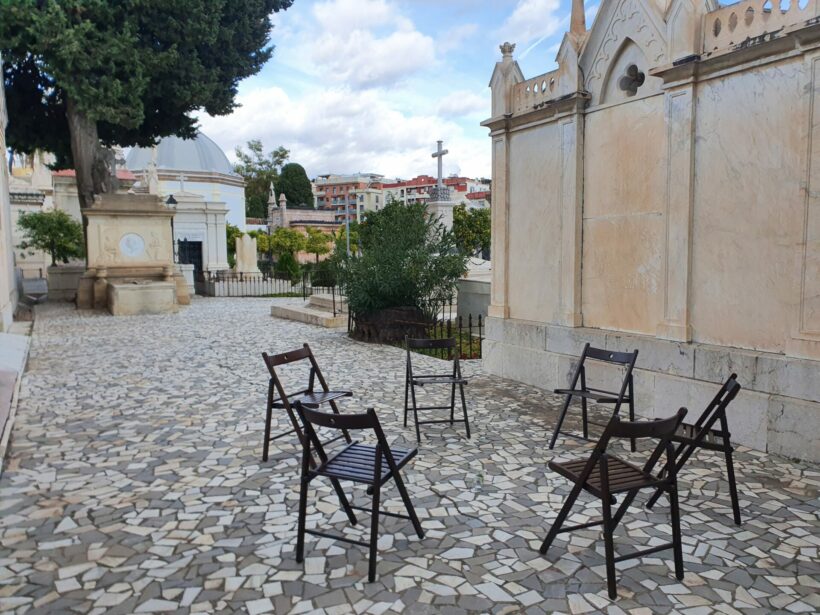What is a Death Café? I asked myself that question in March 2020, in the middle of my confinement. And a very special person, whom I now have the honour to call a friend, Glynis German, gave me the response. After an hour and a half of telephone conversation, a new door opened in my life in the universe of constant learning and personal growth.
By Noelia Correa
I discovered the worldwide movement called Death Café, and I joined the organising committee of the Festival Dando Vida a la Muerte, which this year will celebrate its IV edition, from the 1st to the 5th of November.
But what is a Death Café? Some of you may be sceptical when you hear the name, others may be curious, but nobody is ever indifferent. I’ve even been advised to change the name (complicated, it’s copyrighted!) because they argue that death is not attractive, and that it doesn’t sell. And that is the problem, death is neither bought nor sold, it simply exists.
And despite this overwhelming reality, in our society it is still considered a great taboo, we try vainly to avoid it, and we act as if it did not exist, as if we could avoid it indefinitely.
Nevertheless, death comes. To each and every one of us. If there is one thing in this life that is undeniable, it is that we are born with the certainty of dying one day. We come into this world with an expiry date, and that is indisputable. Whether it would be better to know it is another debate in itself.
So why so much taboo, so much suffering, so much ignorance about this natural and obvious fact? Would it not be wiser to accept as soon as possible that death is inevitable, both for us and for those around us? Perhaps if we accepted it, we would live much more serene and fulfilled lives.
Death Cafés are magical spaces of respect, authenticity and active listening, where laughter and tears are shared, and where the participants are accompanied from the heart on whatever subject they bring with them:
Loss of loved ones, loss of work, truncated dreams, near-death experiences, terminal illnesses, palliative care, living wills, sincere gratitude for life, rare diseases, palliative sedation, the power of forgiveness, childhood, pending grief, personal and cardiac coherence, accompanying without judgement and with profound empathy, limiting or liberating beliefs, detachment, the search for intimacy, humanity, resolved grief, adolescents, joy and a sense of humour, celebrations or funerals, the elderly, burials or cremations, death and life, life and death…
Moments so vital, so human, so necessary… moments that truly matter.
The origins of this movement
Before going any further, I would like to present the origins of this movement that has now spread to more than 80 countries in a decade: inspired by Swiss sociologist Bernard Crettaz’s Cafés du Mort in 2004, Jon Underwood and his mother Sue Barsky started Death Cafés in the garage of their East London home in 2010.
Jon laid down three clear and simple rules… from there on, each facilitator has room to add his or her own personal touch:
- The facilitator cannot charge for facilitating a Death Café, although donations to the hosting space are accepted.
- There is no set programme or theme. This rule may come as a surprise, but a little later you will understand why, which makes each Death Café unique and special.
- No one is an expert, all participants, including the facilitator, are on an equal footing. There is nothing more democratic than death.
Of course, it is assumed that these are completely confidential spaces and respectful of all beliefs, religions and ideas. Interestingly, it is not a therapy or bereavement wheel, as the facilitators are not necessarily therapists or psychologists. However, I might add that Death Cafés are often very healing and therapeutic.
 (Image by Engin_Akyurt)
(Image by Engin_Akyurt)
Let’s continue with the structure of a Death Café
In my role as facilitator, I welcome all participants and introduce the project about the history and creation of the movement, as well as the rules previously mentioned.
Personally, I usually do a short relaxation exercise of about one minute to focus on the present moment.
I then request each attendee to introduce themselves by name, and share why they have decided to join this Death Café today. I emphasise “today” because first-time attendees are generally curious (a very healthy thing that we lose with age). The regular participants (more and more numerous) come for different reasons.
From the introductions and what is shared at that initial moment, the attendees usually start talking. If this doesn’t happen, always respecting the initial silence, I ask some questions or reflections to break the ice and start the dialogue (although I rarely have to intervene).
As facilitator, my task is to speak little and make sure that everyone who wants to participate has the opportunity to do so. It is not obligatory to speak, although I have observed that as soon as participants feel the respectful atmosphere that is created, they tend to share their reflections and experiences.
I would also like to share that Death Cafés are attended by believers, atheists, agnostics, people who have lost loved ones or a job; people with a perspective enriched by life, and others with a younger, more innocent and totally necessary energy. And all of them are welcome at my Death Cafés.
At the end of the two hours, we close the Death Café with a farewell round, where I invite each participant to share what they take away from the meeting.
Reflections after the experience
To close this article, I would like to share my reflections after almost three years of facilitating Death Cafés, in person and online:
That all human beings need to talk about death, but society does not facilitate it. And when death affects our life or that of our loved ones (absolute certainty) we experience great suffering.
To talk about death is to talk about life, and the more I have my mortality present, the more intensely and fully I live each moment.
In Death Cafés we talk about it, stripping it of that charge of taboo, and in doing so, we come closer to it, we become more aware of our physical finitude.
We also talk about more “earthly” but equally crucial issues:
Do you know what it is, or have you made a living will? Have you shared with your relatives your preferences about burial, cremation or other alternatives? And theirs? How many of us can chat openly about this subject with our close relatives? Do you know that there are alternatives to religious rituals and traditional cemeteries? A recurring theme is how to approach the subject of death with children and death, and if it is appropriate to take them to funerals or to leave them at home.
The interesting thing? That there are no right or wrong responses; there is no one truth, but one for each of us; it’s not all black and white, there are infinite shades of grey. And most importantly, you leave the Death Café knowing that you are not alone or crazy in this fast-paced society. You find alternatives and ways of thinking that enrich your perspective and bring you comfort and companionship.
And the most surprising thing? The sense of humour with which we approach the issues that emerge. The laughter we share on many occasions, which often surprises and delights the participants.
They say that experience is the mother of science, so I invite you to look for a Death Café facilitator in your community. Appreciate the richness of these spaces and perhaps you will find in them a circle where you can share your reflections on death and life with other companions on this journey called life.










